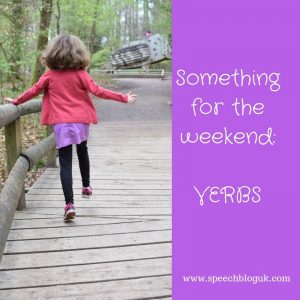This is the third in a series of posts with quick and hopefully simple ideas for you to try this weekend. Life can be busy and it can be so difficult to fit in practising your child’s speech and language targets in the middle of everything else. So the aim of these posts is to save you time and help you to help your child as quickly and painlessly as possible.
Today I’m going to give you a couple of ideas for working on verbs. Verbs are the doing words or action words in a sentence. These words are really important as you move from single words to linking words together.
Activity One
Play a Simon Says type game with your child. Now, by this I just mean give them instructions to follow – the actual “Simon says” part is often very confusing for children with language difficulties, and that’s not what we want to focus on in this activity. Go outside somewhere if the weather’s nice. If it’s not, this will entertain the kids inside for a few minutes as well! Just give simple instructions for your child to follow. EG “can you jump?” “can you run?” etc.
Make sure you have your child’s attention. Say their name and touch them if necessary so that you know they are listening. Then give an instruction. See if they will follow it. If they don’t, say it again. If they still don’t, show them what to do.
Once they have the idea of the game, some children will then be able to join in. Watching you do silly things will also help to get their attention and interest! As you do the activity together, say again what you are doing. Eg “look, we are running”. Try ones which involve them doing a bit of miming as well. For example, “can you brush your hair”. This activity is working on your child’s understanding of verbs.
After a few turns, your child may want to have a turn at giving the instructions. Great! Now you are working on their expressive language as well. Let them try. Some children want to have a go, but don’t know the words. Let them show you what they want you to do and then say the verb for them if they are struggling. The more they hear the word in context, the more likely they are to be able to have a go at saying it themselves.
Remember – some verbs are harder than others. For example, “can you sit” is likely to be easier for a child to follow than “can you spin”. Here are some suggestions of easier and harder verbs to try.
Easier – sit, jump, run, stand, hop, brush, clap, dance, smile, shout, read,
Harder – balance, spin, wink, whisper, tickle, sneeze, snore, exercise, stretch, crawl
Activity Two
Another great way to work on verbs is to link them to objects. Go around your house with your child and find different objects. Talk about what you do with them. “what do we do with a chair?” “what do we do with a spoon?” etc. Again, if your child is not using verbs, let them show you rather than using the word if they need to. When they do, make sure you say the word clearly for them to hear.
Again, your child may need a few examples before they understand what you are asking them.
If your child finds this easy, try getting them to use a bit of imagination. See if they can list a range of things that you could do with an object. For example, “what do you do with a ball?” You might kick it, throw it, bounce it etc. If they find this tricky, mime some for them and see if they can say what you are doing. You could also add some silly ones in. For example, do we chew a ball? Not unless you are a dog!
Good luck. Pop into our Facebook group and let us know how you get on!







Leave a Reply